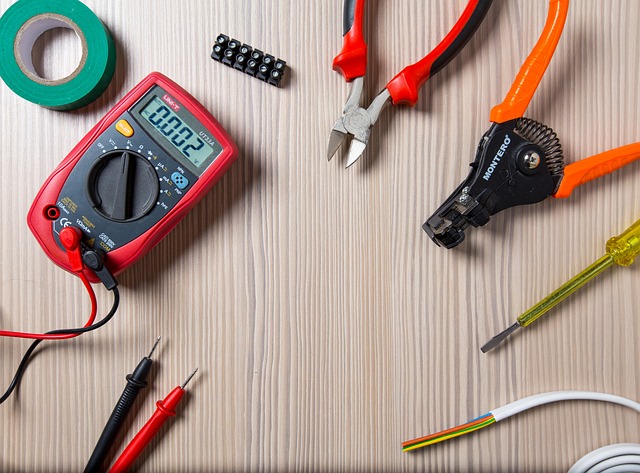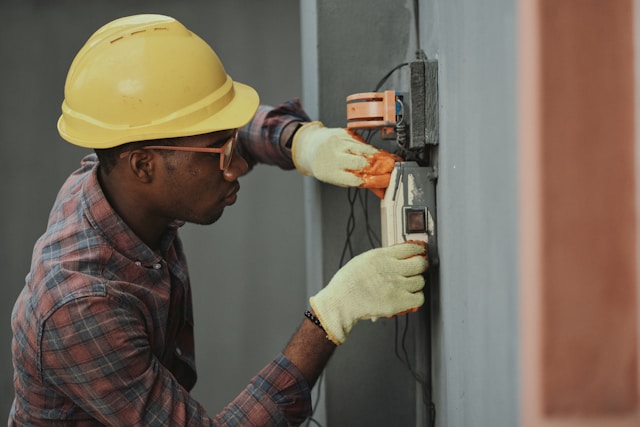Your home’s electrical safety is paramount, and Level 2 electricians play a crucial role in ensuring this. They deal with complex electrical tasks that others can’t handle.
These professionals are trained to perform high-level services like metering equipment installation and mainline strengthening. They are the solution to your various electrical complications.
For reliable Level 2 electrical services, make sure to hire professionals who are available in your area. Don’t compromise on your home’s safety; engage experts today.
Table of Contents
The Role of Level 2 Electricians
The status of a Level 2 Electrician denotes high-level competence in various complex electrical tasks. They are the go-to professionals whether you’re a homeowner or a business owner.
One such task is restoring power in the aftermath of natural disasters like floods. In such scenarios, widespread power outages can occur, requiring their expertise.
A Level 2 Electrician is equipped to evaluate your electrical system’s damage, address arising issues, and restore power safely. Their role extends beyond mere restoration; they can also assist with preventive measures.
Think of instances where upgrading your home’s electricity system is necessary – especially for older properties. These locations often need a power upgrade to sustain the demands of modern appliances.
| Scenario | Role of Level 2 Electrician | Possible Solution |
| Power outage due to natural disasters | Evaluate damage and safely restore power | Install surge protection devices |
| Property requires an electrical upgrade | Assess current system and recommend upgrades | Add extra circuits or safety switches |
| Installation of high-power appliances | Specialized expertise to connect new appliances | Re-wire or upgrade switchboard |
| Construction of complex electrical networks for businesses | Necessary for initial construction and maintenance | Implement an efficient electrical framework |
Level 2 Electricians are qualified to manage varied electrical situations.
So, understanding the role of a Level 2 electrician can help you make more informed decisions when it comes to your property’s electrical system needs.
A Level 2 Electrician can assess your current system and suggest suitable upgrades like rewiring, installing additional circuits, or improving your switchboard.
In the instance of adding new power-hungry appliances like hot tubs, solar panels, or chargers for electric vehicles to your home, it’s crucial to seek these professionals’ input. Such installations call for specialized knowledge that Level 2 Electricians possess.
Their expertise isn’t limited to homes. Business properties require complex grids for which these professionals are in high demand.
Level 2 Electricians: Safe and Efficient Solutions
When installing a Level 2 charger for your electric vehicle, employing a professional electrician is essential. This ensures your charger operates efficiently and safely.
Installation involves introducing a specific 240-volt receptacle akin to the outlets utilized for clothing dryers in your garage or adjacent to your driveway.
The option to hardwire your charger is also available. This may facilitate more rapid charging times, although the procedure may incur additional costs.
“Choosing a professional electrician for installation provides a safety guarantee while optimizing charging performance.”
Typically, installation fees range from $500 to $1,200, with the wall-mounted charging unit costing an extra $500 to $700.
Costs can vary depending on unique circumstances such as home age or need for wiring upgrade which could potentially raise costs into the thousands.
This reinforces the importance of trust in a licensed electrician’s expertise for such installations. The safety and efficiency of your charger can thus be secured.
Preventing Electrical Hazards with Skilled Electricians
Securing homes against electrical hazards is crucial, and skilled electricians play an indispensable role in this aspect.
- Addressing the Battery Hazard: Companies like Electrical Safety First are pioneering initiatives to curtail fires and explosions caused by e-bike and e-scooter batteries.
- Promoting Safety Guidelines: These organizations also provide safety recommendations to e-bike and e-scooter owners to mitigate potential risks.
- Hosting Informative Events: Free half-day events hosted by these organizations bring together a diverse mix of people, from manufacturers to government bodies, with discussions on key trends in the electrical installation industry.
- Publishing Insightful Reports: Data-driven publications such as the “Battery Breakdown” report highlight the causes of dangerous fires and suggest safety improvement measures. Similarly, “Future Homes” underscores electrical risks associated with net zero transitions and provides safety recommendations.
Skilled electricians can delve into these resources for deeper understanding and apply them practically to ensure home safety.
An integral part of reducing electrical risks is avoiding counterfeit products; resources are available to assist users in identifying original over fake.
The importance of every home having access to skilled electricians cannot be overstated due to their role in preventing potential electrical hazards and promoting safety.
Achieving Electrical Code Compliance at Home
Modern housing codes require numerous considerations in areas like energy efficiency, wiring standards, and weather-proofing. But how can you ensure your home meets these standards? Let’s break it down.
Wiring Standards Changes
Wiring adjustments occur frequently in residential construction. For example, aluminum wiring is no longer used except for service entry wiring. Another essential advancement is the requirement for ground fault circuit interrupters near wet areas.

Preparing For Severe Weather Conditions
To protect homes from harsh weather conditions such as hurricanes and blizzards, enhanced wind load and snow load requirements have been developed. These are to strengthen structural elements of homes.
Maintaining Energy Efficiency
Energy efficiency improvements have been addressed indirectly through various regulations. This includes the use of double-insulated HVAC ductwork and minimum insulation standards for walls and ceilings.
Hiring an Experienced Inspector
To guarantee all these requirements are met, hiring a competent inspector is crucial. Choose someone with vast experience and a good reputation in the industry.
Evaluating Electrical Systems
The electrical panel box should be checked to guarantee correct circuit labeling and matching breakers. An experienced electrician can inspect the wiring connections to breakers and determine wire size, type, and grounding legs for circuits.
Assessing Home Infrastructure
In older houses, decades of DIY fixes can lead to potential fire hazards or electrocution problems. A well-established electrician can instantly tell you if major repairs are needed.
Check also the attic for hurricane clips on roof framing members, depth of attic insulation, wiring cable strapping, installation of junction box covers, and other construction details.
The Importance of Home Electrical Safety Devices
Electricity is an essential part of our homes, but when not managed properly, it can pose significant risks. Reports indicate that up to 40% of house fires in NSW each year are caused by electrical faults and appliances.
Why do we need safety switches?
Safety switches, also known as Residual Current Devices (RCDs), are integral parts of a home’s electrical system. These devices monitor the flow of electricity through a circuit and disrupt the supply instantly if an abnormality is detected.
What about older homes?
Homes built before the year 2000 may not have safety switches installed. In such cases, consulting with a licensed electrician is strongly advised to ensure your home is compliant and safe.
Is DIY electrical work okay?
Unless you are a qualified electrician, never try wiring any part of your property or installing and replacing electrical appliances. Improper handling of electrical components can result in damages or potential accidents.
How can we test safety switches?
Testing safety switches twice annually helps ensure they’re effective. After pressing the test button on each safety switch, check to make sure no power flows to the particular circuit being tested.
What about solar power safety?
Solar PV systems require careful handling too. You should never turn off or reconnect these systems if they are wet or if your roof has been damaged respectively.
How safe are portable electricity generators?
Always operate portable generators outdoors and ensure they remain dry at all times. Plug appliances directly into the generator and employ heavy-duty outdoor-rated cords for extensions.
Who is responsible for safety switches in rental properties?
Property owners are responsible for making sure that their rental properties have safety switches installed. Fair Trading can coerce landlords or tenants to fix electrical faults where necessary.
What is the protocol for getting electrical work done?
Always hire a licensed electrician to carry out any necessary electrical work in your home. They should provide a numbered Certificate of Compliance Electrical Work (CCEW) after the job.
To learn more about home electrical safety, you might want to visit the NSW government’s official page.
Protection Against Fires with Level 2 Electricians
It is important that level 2 electricians are equipped with the knowledge necessary to mitigate the risks of electrical fires.
- Enforced Fire Safety Training: This involves understanding the causes of electrical fires and how to effectively protect against them.
- Knowledge of Electrical Arcing: When a current jumps between conductive materials, it can generate temperatures that exceed 10,000 degrees Fahrenheit and potentially ignite flammable substances.
- Proficiency with Ground Fault Circuit Interrupters (GFCIs): These devices minimize risk by deactivating power in certain circuits.
- Familiarity with Arc Fault Circuit Interrupters (AFCIs): Focusing on older homes where wiring may not meet modern standards, these are designed specifically to prevent arc-induced fires.
Equipping an electrician is further improved by familiarity with fire suppression systems, continuous temperature monitoring, isolating electrical equipment, and others – each helping in their individual ways at preventing fires.
Following this should also include ensuring the use of smoke detectors and having accessible fire extinguishers in every room, particularly Class C extinguishers.
In addition to physical measures, promoting safe appliance use and conducting regular inspections help maintain compliance with safety standards.
Other precautions, such as surge protection, circuit breakers and fuses, and utilizing fire-resistant construction materials, contribute towards effectively managing risks. This information is built upon shared experiences from professionals, which can be found here.
Handling these varied responsibilities demonstrates why an intimate familiarity with fire protection matters is becoming increasingly important for level 2 electricians and is a service valued by homeowners.
Inspecting Your Electrical Panel for Safety
The safety measures taken during electrical work are crucial, which begins by knowing one’s limitations. Therefore, it’s always safe to engage a licensed electrician.
Prepping for the Safety Inspection
Top wiring hazards can lead to harmful consequences. To prevent this, turning off the power before starting any work is essential.
The Need for Protective Gear
Appropriate protective gear, such as goggles and gloves, enhances safety during electrical jobs. This protection helps avoid any unwanted accidents that might occur.
Prudent Work Practices
In case of working in proximity to water sources like bathrooms, kitchens, or laundry rooms, special caution must be taken to avoid any fatal accidents.
Completing the Work with Precision
Safety code adherence ensures that completed electrical projects are secure and won’t pose future risks. Structured organization of wires minimizes complications.
Engaging Professional Electricians
If the perceived task seems complicated, hiring an adept local electrician would be a prudent choice. This decision assures work safety and compliance with local electrical regulations.
Safety Tips for Electrical Repairs at Home
Maintaining a safe home environment involves taking the necessary steps to prevent electrical accidents. These tips can help significantly.
- Inspect and replace damaged cords: Faulty power cords are a safety risk that should be handled immediately.
- Monitor power consumption: Overloading an outlet can lead to fires, so limit gadgets connected to individual outlets.
- Be careful around water: Keep electrical appliances away from restrooms and water bodies; they don’t mix!
- Audit your electrical setup: Regularly check plugs, sockets, and appliances for wear and tear.
- Avoid heat sources: Don’t place cords near heat sources like stoves or toasters; they’re dangerous.
- Secure areas accessible to children: Always ensure unused plugs are protected with tamper-proof safety caps. Also, keep cords out of reach of children.
- Turn off inactive electronics: Double-check that all inactive fans, lights, and appliances are turned off before leaving home or retiring for the day.
- Switch off before cleaning appliances: Unplugging electrical devices before cleaning prevents accidents.
To be effective in preventing electrical mishaps at home requires vigilance and adherence to these tips. Danger may lurk in some unexpected corners of your house.
When attempting electrical repairs, ensuring safety sometimes requires consulting with a licensed electrician. Prepare adequately and never compromise on safety.
Essential Electrical Safety
Remember, the safety of your home largely depends on a level 2 electrician’s expertise. They’re the guardians who protect your home against electrical hazards.
By hiring these specialists, you ensure the safety and longevity of your home’s electrical system. They’re instrumental in preventing potential accidents and maintaining a safe living environment.
Check out this site for more information about professional Level 2 electricians ready to serve you. Don’t compromise; secure your home today.




